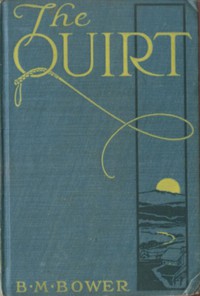The Quirt by B. M. Bower (good novels to read .TXT) 📗

- Author: B. M. Bower
Book online «The Quirt by B. M. Bower (good novels to read .TXT) 📗». Author B. M. Bower
shoulders, and slumped to the ground.
Frontispiece. See page 294. THE QUIRT
[Pg v]
CONTENTS chapter page I Little Fish 1 II The Enchantment of Long Distance 12 III Reality is Weighed and Found Wanting 22 IV "She's a Good Girl When She Ain't Crazy" 38 V A Death "By Accident" 54 VI Lone Advises Silence 68 VII The Man at Whisper 85 VIII "It Takes Nerve Just to Hang On" 100 IX The Evil Eye of the Sawtooth 115 X Another Sawtooth "Accident" 126 XI Swan Talks With His Thoughts 144 XII The Quirt Parries the First Blow 158 XIII Lone Takes His Stand 168 XIV "Frank's Dead" 178 XV Swan Trails a Coyote 192 XVI The Sawtooth Shows Its Hand 200 XVII Yack Don't Lie 216 XVIII "I Think Al Woodruff's Got Her" 233 XIX Swan Calls For Help 245[pg vi] XX Kidnapped 255 XXI "Oh, I Could Kill You!" 264 XXII "Yack, I Lick You Good if You Bark" 277 XXIII "I Coulda Loved This Little Girl" 284 XXIV Another Story Begins 296 THE QUIRT[Pg 1]
THE QUIRT CHAPTER ONE LITTLE FISHQuirt Creek flowed sluggishly between willows which sagged none too gracefully across its deeper pools, or languished beside the rocky stretches that were bone dry from July to October, with a narrow channel in the center where what water there was hurried along to the pools below. For a mile or more, where the land lay fairly level in a platter-like valley set in the lower hills, the mud that rimmed the pools was scored deep with the tracks of the "TJ up-and-down" cattle, as the double monogram of Hunter and Johnson was called.
A hard brand to work, a cattleman would tell you. Yet the TJ up-and-down herd never seemed to increase beyond a niggardly three hundred or so, though the Quirt ranch was older than its lordly neighbors, the Sawtooth Cattle Company,[Pg 2] who numbered their cattle by tens of thousands and whose riders must have strings of fifteen horses apiece to keep them going; older too than many a modest ranch that had flourished awhile and had finished as line-camps of the Sawtooth when the Sawtooth bought ranch and brand for a lump sum that looked big to the rancher, who immediately departed to make himself a new home elsewhere: older than others which had somehow gone to pieces when the rancher died or went to the penitentiary under the stigma of a long sentence as a cattle thief. There were many such, for the Sawtooth, powerful and stern against outlawry, tolerated no pilfering from their thousands.
The less you have, the more careful you are of your possessions. Hunter and Johnson owned exactly a section and a half of land, and for a mile and a half Quirt Creek was fenced upon either side. They hired two men, cut what hay they could from a field which they irrigated, fed their cattle through the cold weather, watched them zealously through the summer, and managed to ship enough beef each fall to pay their grocery bill and their men's wages and have a balance sufficient to buy what clothes they[Pg 3] needed, and perhaps pay a doctor if one of them fell ill. Which frequently happened, since Brit was becoming a prey to rheumatism that sometimes kept him in bed, and Frank occasionally indulged himself in a gallon or so of bad whisky and suffered afterwards from a badly deranged digestion.
Their house was a two-room log cabin, built when logs were easier to get than lumber. That the cabin contained two rooms was the result of circumstances rather than design. Brit had hauled from the mountain-side logs long and logs short, and it had seemed a shame to cut the long ones any shorter. Later, when the outside world had crept a little closer to their wilderness—as, go where you will, the outside world has a way of doing—he had built a lean-to shed against the cabin from what lumber there was left after building a cowshed against the log barn.
In the early days, Brit had had a wife and two children, but the wife could not endure the loneliness of the ranch nor the inconvenience of living in a two-room log cabin. She was continually worrying over rattlesnakes and diphtheria and pneumonia, and begging Brit to sell out and live in town. She had married him because he was a[Pg 4] cowboy, and because he was a nimble dancer and rode gallantly with silver-shanked spurs ajingle on his heels and a snakeskin band around his hat, and because a ranch away out on Quirt Creek had sounded exactly like a story in a book.
Adventure, picturesqueness, even romance, are recognized and appreciated only at a distance. Mrs. Hunter lost the perspective of romance and adventure, and shed tears because there was sufficient mineral in the water to yellow her week's washing, and for various other causes which she had never foreseen and to which she refused to resign herself.
Came a time when she delivered a shrill-voiced, tear-blurred ultimatum to Brit. Either he must sell out and move to town, or she would take the children and leave him. Of towns Brit knew nothing except the post-office, saloon, cheap restaurant side,—and a barber shop where a fellow could get a shave and hair-cut before he went to see his girl. Brit could not imagine himself actually living, day after day, in a town. Three or four days had always been his limit. It was in a restaurant that he had first met his wife. He had stayed three days when he had meant to finish his business in one, because there was an[Pg 5] awfully nice girl waiting on table in the Palace, and because there was going to be a dance on Saturday night, and he wanted his acquaintance with her to develop to the point where he might ask her to go with him, and be reasonably certain of a favorable answer.
Brit would not sell his ranch. In this Frank Johnson, old-time friend and neighbor, who had taken all the land the government would allow one man to hold, and whose lines joined Brit's, profanely upheld him. They had planned to run cattle together, had their brand already recorded, and had scraped together enough money to buy a dozen young cows. Luckily, Brit had "proven up" on his homestead, so that when the irate Mrs. Hunter deserted him she did not jeopardize his right to the land.
Brit was philosophical, thinking that a year or so of town life would be a cure. If he missed the children, he was free from tears and nagging complaints, so that his content balanced his loneliness. Frank proved up and came down to live with him, and the partnership began to wear into permanency. Share and share alike, they lived and worked and wrangled together like brothers.
For months Brit's wife was too angry and[Pg 6] spiteful to write. Then she wrote acrimoniously, reminding Brit of his duty to his children. Royal was old enough for school and needed clothes. She was slaving for them as she had never thought to slave when Brit promised to honor and protect her, but the fact remained that he was their father even if he did not act like one. She needed at least ten dollars.
Brit showed the letter to Frank, and the two talked it over solemnly while they sat on inverted feed buckets beside the stable, facing the unearthly beauty of a cloud-piled Idaho sunset. They did not feel that they could afford to sell a cow, and two-year-old steers were out of the question. They decided to sell an unbroken colt that a cow-puncher fancied. In a week Brit wrote a brief, matter-of-fact letter to Minnie and enclosed a much-worn ten-dollar banknote. With the two dollars and a half which remained of his share of the sale, Brit sent to a mail-order house for a mackinaw coat, and felt cheated afterwards because the coat was not "wind and water proof" as advertised in the catalogue.
More months passed, and Brit received, by registered mail, a notice that he was being sued for divorce on the ground of non-support. He[Pg 7] felt hurt, because, as he pointed out to Frank, he was perfectly willing to support Minnie and the kids if they came back where he could have a chance. He wrote this painstakingly to the lawyer and received no reply. Later he learned from Minnie that she had freed herself from him, and that she was keeping boarders and asking no odds of him.
To come at once to the end of Brit's matrimonial affairs, he heard from the children once in a year, perhaps, after they were old enough to write. He did not send them money, because he seemed never to have any money to send, and because they did not ask for any. Dumbly he sensed, as their handwriting and their spelling improved, that his children were growing up. But when he thought of them they seemed remote, prattling youngsters whom Minnie was forever worrying over and who seemed to have been always under the heels of his horse, or under the wheels of his wagon, or playing with the pitchfork, or wandering off into the sage while he and their distracted mother searched for them. For a long while—how many years Brit could not remember—they had been living in Los Angeles. Prospering, too, Brit understood. The girl, Lor[Pg 8]raine—Minnie had wanted fancy names for the kids, and Brit apologized whenever he spoke of them, which was seldom—Lorraine had written that "Mamma has an apartment house." That had sounded prosperous, even at the beginning. And as the years passed and their address remained the same,





Comments (0)